This article is in a series designed not to provide ‘A N Other’ opinion about a chef’s output, to be lost in the now sea of increasing ‘noise’ about top end dining. In this article the chef will analyse three of their signature dishes against aspects of the five criteria used by Michelin for awarding a Michelin star. As a reminder the five criteria were explained under interview by Michael Ellis (at the time WW Director of Michelin Guides) and are given below as he described:-
“The first and most important criteria is the provenance of ingredients, all great cuisine starts with great product – the actual product itself is considered for freshness, quality, flavour and texture and so on. The second criteria is mastery of cooking technique. The third criteria is equilibrium and harmony in flavours… The fourth criteria is regularity (or consistency) and this means starter, main and dessert are each of the appropriate standard and that each are also consistent over time. Finally, value for money is the fifth criteria.”

[Chef Ben Murphy of Launceston Place]
Ben Murphy’s first love was sport, football in particular, indeed he was on the verge of signing professionally for QPR when a broken collarbone brought a premature end to that fledgling career. Leaning on school experience of an enjoyment of food tech and history of art, Ben had the opportunity to take a three year course at high-end catering college Westminster Kingsway.
Fresh from graduation, Ben grasped the opportunity of a role as a commis at the opening of Koffmann’s at The Berkeley. With over twenty-six chefs in the kitchen, Ben started on pastry and over a three and a half year period developed his skills across the sections under the watchful eye of his mentor, Pierre Koffmann. With Pierre’s assistance, Ben moved to Les Prés d’Eugénie under the legendary Michelin three star chef Michel Guérard, before a year spell at the likewise Michelin three starred Épicure at Le Bristol in Paris. When Ben returned to London it was to be under Michelin two starred chef Arnaud Bignon at The Greenhouse. Ben also enjoyed brief stagiaires in New York with Per Se and Eleven Madison Park as well as at Michelin two star Sat Bains in Nottingham.
The first Head Chef role was to come about at the Woodford in East London, where Ben earned the accolades ‘chef to watch’ in the 2016 Waitrose Good Food Guide and ‘Breakthrough Chef of the Year’ at The Food & Travel Awards.
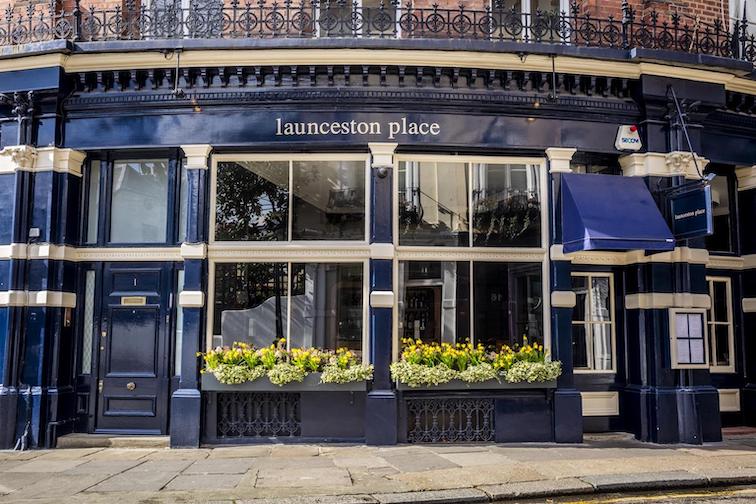
Since joining D&D’s Launceston Place as Head Chef in January 2017, Ben has further developed a signature consistent throughout the menu, that compromises a pleasing on the eye approach with apparent simplicity. This style, like most top end restaurants, belies the complexity of the multi-stage cooking techniques and processes that sit behind each dish’s production.
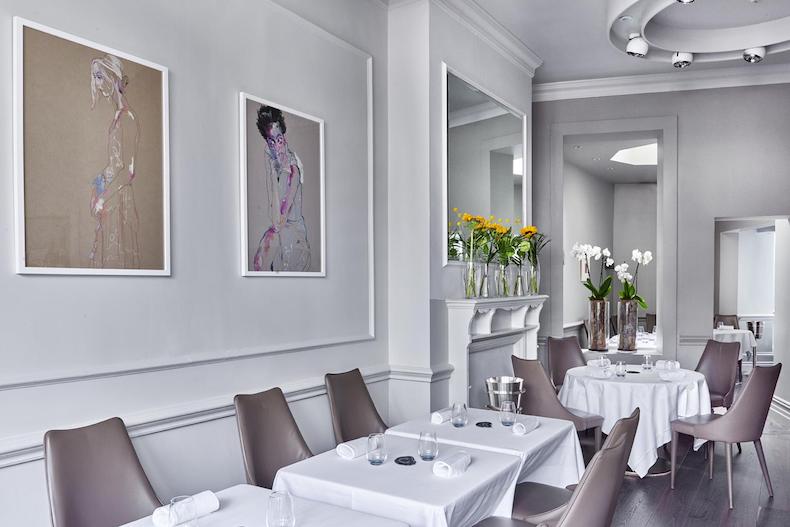
[Launceston Place Restaurant]
The three signature dishes to be reviewed by Ben Murphy are the ‘Egg and Soldiers’ from the tasting menu, the ‘Lobster’ from the dinner à la carte and the ‘Presa Ibérica’ dish. Each will be discussed in terms of cooking technique and balance and harmony on a plate. This will be supplemented by a general overview of how consistency across the menu and over time is achieved. The method of quality and consistency of provenance is also considered.
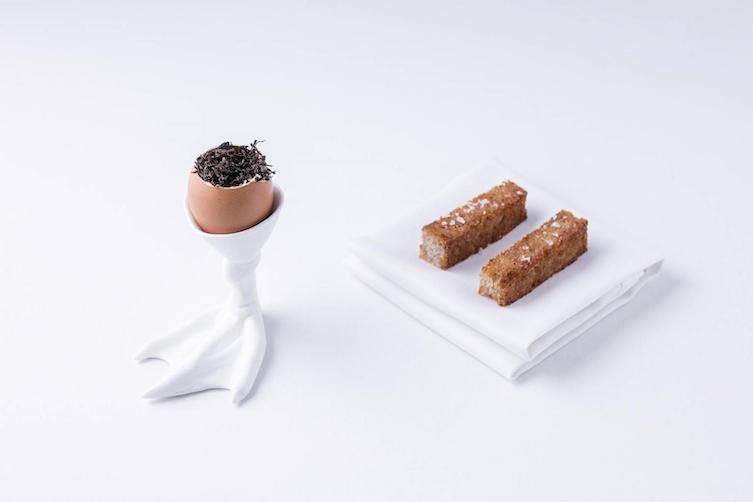
The egg and sourdough ‘soldiers’ dish is based on a childhood memory: Ben would invariably be cutting the top off an overcooked egg and eating shell at the same time with his slices of white bread. At Launceston Place, Ben has an egg cutter that removes the top of the egg shell, the remainder is washed and readied as a vessel for a heady mixture of luxury. Firstly, a foie gras royale provides the initial layer – a sublime taste, temperature and texture seduction. The warm foie gras custard is steamed for five to six minutes and set. Scrambled egg is blended into a mousse and put into a syphon gun so it is aerated and fluffy and provides a second layer. Sourdough bread is made in house and cut into slices and fried. In fact, as Ben makes his own bread in house, the restaurant may rightly take credit for the production of dishes on the menu from canapé through to petits fours and everything in between. There’s textural balance and harmony through the smoothness of the foie gras Royale, the fluffiness of the egg and the crunch of the bread. The webbed foot crockery presentation of the dish further appeals to the sense of sight on top of the flavour, texture and temperature impact.
Ben talks about consistency as a key mantra of his kitchen. There are folders for recipes and everything is weighed to ensure the same results each time a dish is produced, to the extent that even the salt and pepper seasoning is measured out. Prior to each service Ben will personally taste every gel, foam or purée as well as tasting through service. The kitchen is small and compact so Ben sees everything that goes past him. This helps reaffirm the quality standards found in the dishes sent out by the kitchen.
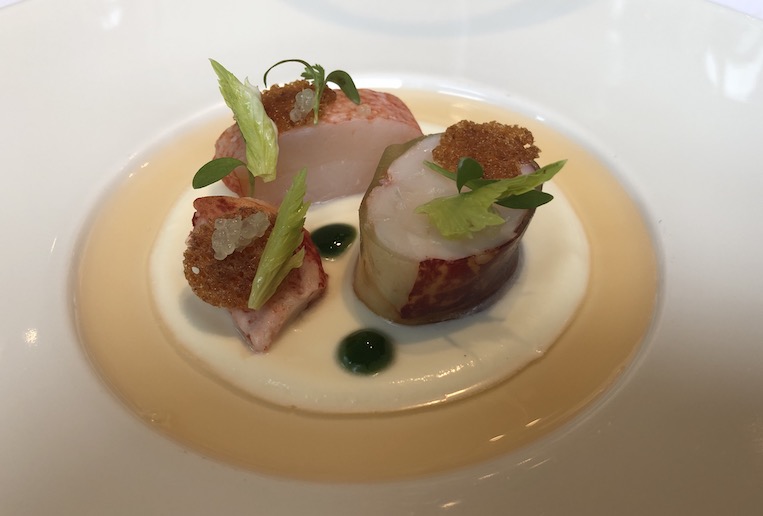
In terms of the lobster dish, Ben likes to use the whole of the crustacean. The restaurant receives live lobsters that are then cooked in a lobster bouillon. The claws are cooked for two or three minutes depending on size, as are the knuckles, the tails are tied and cooked for three minutes. Ben lets the meat cool naturally, not putting it on ice. A celery gel is produced using kappa, which is a skill Ben learned while at the Michelin three star restaurant Épicure at Le Bristol. In the finished dish, the richness of the lobster meat is cut by the freshness of the yuzu cream and garnished with lobster oil. Ultimately, customers get the full rounded lobster taste and texture experience with coriander to further lift and enhance the flavours.
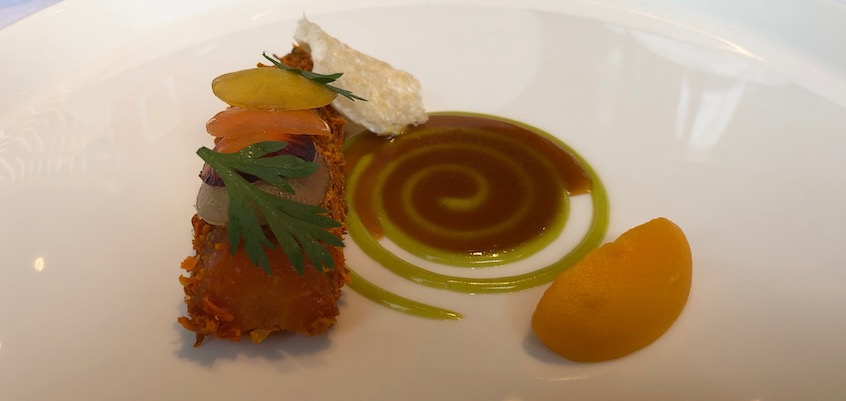

The Presa Ibérica dish has been on the menu for two and half years but in different forms – it originated as two separate dishes. The protein first came with aubergine and the carrot was a separate vegetarian tasting dish. Ben realized these would work so well together that he amalgamated the dishes. A medium sized carrot is coated in a carrot crumb then from the green top of the carrot an emulsion is produced. The trimmings make a carrot purée and further a carrot infused pork sauce provides a finishing touch. The pork is cooked in a pan for four minutes seasoned with timut pepper – nothing is sous vide in the kitchen. The large potato chips take four minutes to fry and the carrot garnish will be ready in unison, Ben will orchestrate plating to ensure immaculate timing in dish creation.
There are five chefs covering the service although Ben gets one more chef in for the busiest services. The same suppliers over three years have seen and tasted the food, so Ben has a great relationship that helps with consistency of provenance. There’s no pressure on the kitchen to use the D&D Group suppliers so to a degree the restaurant stands independent as a destination restaurant. Indeed, Ben can’t fault the level of support the Group has provided in aiding the evolution of the offering at Launceston Place.
Overall Ben Murphy strikes the diner as a chef that has completed a form of journey to deliver a consistent theme of his personality on a plate. They say that a great chef’s protégés can achieve one Michelin star by producing, to a high standard in a subsidiary restaurant, a subset of their mentors’ creations. For a dozen years from the millenium, Gordon Ramsay Holdings were a great example of this observation and exemplified a comment made by then editor Derek Bulmer in a fine dining guide interview of 2005.
There is another set of chefs who work in independent restaurants who assume their first head chef role and produce tasting menus that in part are their own creations but also display dishes that are an homage to mentors of their past. The first star is perhaps a hurdle on the path to displaying a full repertoire in line with these chefs’ own consistent creative instincts and personality. “Wherever I ate this dish I would know it was Michael Wignall’s food” is perhaps a compliment befitting a chef that reaches two Michelin stars as opposed to one Michelin star.
Ben Murphy has his own distinctive signature and although there are the five criteria by which these standards are measured, he is surely knocking on the door of a first star and with his playfully themed consistent offering on full display, he must enjoy the significant potential to go further. Fine dining guide senses that if there are gains to be made they are at the edges of touch rather than the search for anything fundamental. The full dining room and growth in customer base year on year are testament to that fact. No doubt under the watchful eye of the likes of Michelin, long may his career continue to blossom and fine dining guide looks forward to following Ben’s career with interest.



